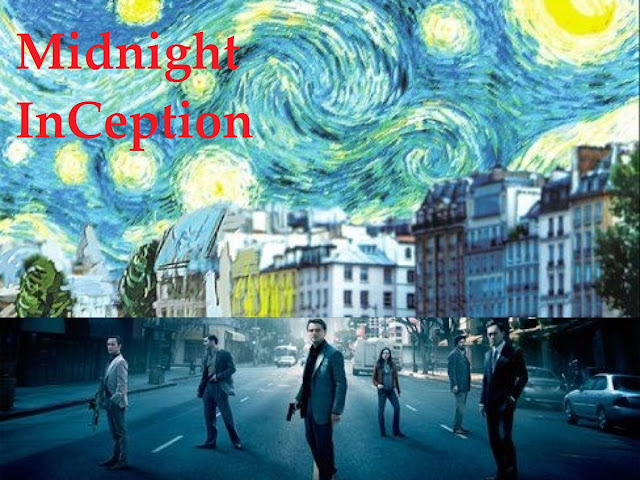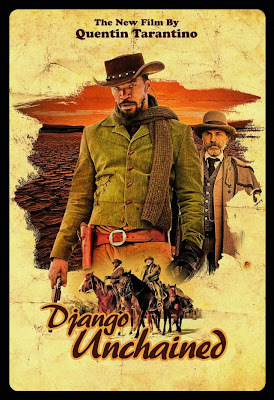Midnight InCeption
The summers of 2010 and 2011 have provided me with two films that, on the surface, have very little in common with one another; however, after some careful consideration, I have found many intriguing similarities between the two. I am speaking of 2010’s Inception, written and directed by Christopher Nolan, and 2011’s Midnight in Paris, written and directed by Woody Allen. These films are unlikely allies, because, in a broad sense, they are both very concerned with the concept of dreams. Both films contain a somewhat multi-layered approach to their concepts and story and were met with much success both critically and financially. It would seem audiences were on board for multifaceted thinking in the case of both a blockbuster film and a low key “art house” comedy. Regardless, I had a simple goal in mind, which I hope properly puts forth how I wanted to turn a single idea into an in-depth article concerning two films I greatly admire. [Major spoilers for both films, beyond this point]
Cobb: Dreams feel real while we're in them. It's only when we wake up that we realize something was actually strange.
To reiterate some plot key plot points as a brief refresher, in Inception, Leonardo DiCaprio’s character, Cobb, is leading a team of corporate spies, with a particular skill in entering unconscious minds and extracting information. It is theft via the use of dreams. The main thrust of the film involves Cobb pulling off the ultimate dream heist by planting an idea into a target’s mind, referred to as “inception”. Cobb’s ultimate reward for this is to no longer work within dream realities and to return home. In Midnight in Paris, Owen Wilson’s character, Gil, is a hack screenwriter spending time with his fiancée in Paris, wishing his nostalgic desires could help him to write his own original novel. Things take a turn as a magical experience leads to Gil actually entering 1920s Paris, night after night, after the clock strikes midnight. This leads to Gil getting a chance to explore his dream time period, meeting many of his idols, and dealing with his nostalgic desires head on, eventually facing a choice of which reality he should stay within.
Both of these films share some key plot elements. In Midnight in Paris and Inception, both films have characters that move through various layers of reality in a sense. In Inception, the characters move through the layers of another’s subconscious. In ‘Midnight’, characters move through different time periods. Both films have their characters moving through multiple layers, as people either go deeper and deeper into another’s subconscious or further and further back in time. Characters also manage to become lost in both, over the course of the film. In Inception, the term “Limbo” is used to describe a very deep subconscious level, where a few characters eventually become stuck as a result. With ‘Midnight’, there is a character who goes too far back in time (which is more of a sight gag), but there is also the notion of Gil and Adriana (Marion Cotillard) getting lost in the love of the idea of staying in their preferred time periods. The goals in both films are similar as well. Inception revolves around planting an idea and hoping it grows and ‘Midnight’ revolves around Gil hoping to find his ideas and advice, in order to grow as a writer.
It is fun to think about these two films on a similar level, especially given how different they would appear to be on the outside. This comparison even extends to the basic “gimmick” that gives these films their hook. Each film has an inconsequential narrative device to bring the characters into new realities. Inception requires an unexplained science fiction gadget to bring individuals into the world of their own and other’s subconsciouses. Midnight in Paris uses an unexplained fantastical twist to allow Gil to go back in time and explore his dream paradise. These two films are seemingly divided by genre and appeal (fantasy vs. technology; a summer blockbuster vs. a low budget romantic comedy), yet they share an interesting and similar core concept.
Regarding the characters, Gil relates to two characters from Inception quite well. Gil and Cobb are both our protagonists for their respective films. The two of them, in the broadest of terms, are smart, well-groomed, and good at what they do. They also find themselves at odds with others, due to their own issues. Cobb is on the run, while Gil disappears at night, causing the suspicions of others. The two also face decisions that need to be made during their tenure within either another subconscious layer or within the past, which will lead to further intriguing plot developments, along with ultimate decisions that will effect the fate of other characters. The two are thematically connected as well. Cobb has had difficulties separating his perception of reality, given that he literally has the ability to manipulate it or have it manipulated around him by others. Similarly, Gil has difficulties in which reality he would prefer to be in, having been given the ability to travel back and forth through time. Both are men who could be lost in a dreamscape of sorts, were they to become too careless in finding out what they are after.
The other character that Gil relates to in Inception is Ellen Page’s character, Ariadne. In both films, these characters serve as the “in character”, which the audience can best relate to. Following an intro that sets up some of the plot and tone of the film, we are introduced properly to the world of subconscious dream levels via Ariadne, who is learning about the whole concept first-hand for the first time. Gil is simply taken in by a group of strangers, thinking he is going for a random drive, only to discover that he has entered an entirely different time period. It can also be said that both characters, who can be considered “newbies” to all of this, are able to adjust fairly quickly to these new experiences. Ariadne quickly learns how to alter the realities of the subconscious, while Gil finds himself learning, relating, and giving his own forms of advice to various writers and artists. While Inception has more of a task in delivering all of the exposition up front to keep from losing its audience, ‘Midnight’ is more succinct, given that it lets Gil (and us) discover more about his situation as he goes; yet both have these solid starting points in the form of characters to relate with.
Ariadne: An elegant solution for keeping track of reality.
It is also interesting to note how both Gil and Cobb relate to the filmmakers. Owen Wilson and Leonardo DiCaprio are playing people who are very much ciphers, for director’s Woody Allen and Christopher Nolan. Wilson is very much in the role of a classic “Woody Allen character”, which Allen surely would have played back in his earlier days. There is most likely some personal elements associated with this film as well, given that Allen likes to put himself and his perspectives into his own scripts. Gil is an intellectual persona, with aspirations for a greater and more respected living, while also dealing with his own romantic entanglements. There are of course neurotic elements that can be attributed to who this man is as well, but watching Gil get by on his wits and his genuine curiosity keeps him pushing the story forward and the audience entertained.
DiCaprio’s role as Cobb seems to fit in quite well with the tone of what Nolan has explored in the past. While Cobb’s backstory is shown, his basic demeanor has a notion of outwardly expressed confidence and cool, backed by a level of guilt, but also cold distance, which has been a side effect of many of Nolan’s films (not necessarily in a bad way). Cobb has also shown that he is capable of working in a very large sandbox of ideas within new realities, when need be, just as Nolan has proven his ability to explore his own various sandboxes, when it comes to large scale filmmaking. DiCaprio and Nolan even have similar physical appearances and given that Nolan developed the story and screenplay for Inception himself, it seems apparent that this personal project may have purposefully, or perhaps subconsciously, effected his choice in casting. Almost too bizarrely appropriate, but the fact remains that these ciphers for the filmmakers are clearly being expressed in some capacity on screen.
A key element for me, which was the element in both films that gave me enough inspiration to pursue this idea for an article, is the lovely Marion Cotillard. She is the constant in both films, as her characters (Mal and Adriana) end up performing many of the same actions. Mal and Adriana are both attractive women who have and form a romantic connection with the lead characters. They are also both incredibly intrigued by the notion of exploring the multi-layered subject matter of the film’s broadest description. Mal spends decades with Cobb exploring the manipulation of the subconscious dream environments. Adriana is immediately taken with her visit with Gil to the Golden Age, which she very much admires. Both women end up so intrigued by these realities that they decide to stay, giving up the idea of what true reality is, in favor of pursuing a dream. Given that Inception is the darker of the two films, we also see a consequence for being so enamored by the concept of pursuing a new reality, while only being able to speculate whether Adriana ends up concluding which reality truly is right for her.
These women also prove to be a distraction to both lead characters as well. For Cobb, this is very much an issue, given that Mal is literally a malicious force that effects his ability to function properly. For Gil, Adriana is a challenge for him, as he deals with his true thoughts in regards to his own fiancée, Inez (Rachel McAdams). Adriana also proves to be one who clouds his mind from what remaining back in time would ultimately mean. Despite the allure of Cotillard in both of these roles, Cobb and Gil ultimately make a decision to resolve their situations.
Gil: Adriana, if you stay here though, and this becomes your present then pretty soon you'll start imagining another time was really your... You know, was really the golden time. Yeah, that's what the present is. It's a little unsatisfying because life's a little unsatisfying.
Adriana: That's the problem with writers. You are so full of words.
The effects of involving themselves in deeper levels of realities lead Gil and Cobb to similar conclusions. Both characters eventually come to the realization that it is best for them to reject the idea of staying within their dream environments. There is a mixed level of disaster for Gil and Cobb because of this. Gil loses his fiancée, who cheats on him during the whole experience, in favor of remaining in Paris. Cobb loses his wife, who commits suicide, and is forced to go on the run. Both men, however, also manage to achieve a certainty they wanted all along. Gil allows himself to appreciate nostalgia and modernism, but ultimately stays in Paris, within his own time and relates to others with a shared interest, picking up a new love interest in the process. Cobb manages to achieve the goal of seeing the faces of his children, after accomplishing the mission with his team, and safely retrieving his employer in the process (there is ambiguity in regards to the actual reality Cobb is within, in the film’s finale, but that’s another story).
Both films managed to be incredibly successfully, even with some odds against them. Inception was a $200 million passion project, which could have fallen flat with audiences. Midnight in Paris was another low-key release from Woody Allen, who releases a film every year, with some arguing that his best years are behind him. Despite possible setbacks, both films were embraced by critics and audiences, proving to be strong successes where it counted, including high box office grosses (‘Midnight’ is currently Allen’s highest grossing film, while Inception was a blockbuster success worldwide) and the recipients of many award accolades, such as Oscar nominations and awards.
The idea of matching these two films to each other has been something I have had the desire to do since June of 2011. Watching Midnight in Paris and having various realizations about its similarities to Inception was very intriguing to say the least. Being that both of these are films I admire very much, it was something I had the desire to pursue further. Even if one were to have their share of issues with either of these films, I would find it hard to believe that they could not at least acknowledge that these films do share a lot more in common than they would expect at first glance. Regardless, I would not expect this to go down as a great cinematic find or even one that begs further comparison years down the road. However, I can only hope the level of joy I had in further exploring these two films, is reflected in my prose. I may not have trained in subconscious manipulation or received input from Ernest Hemingway and Gertrude Stein, but I did at least strive for something that did not result in me getting too lost in an idea; instead keeping my own reality interesting with a fun diversion.












Comments
Post a Comment